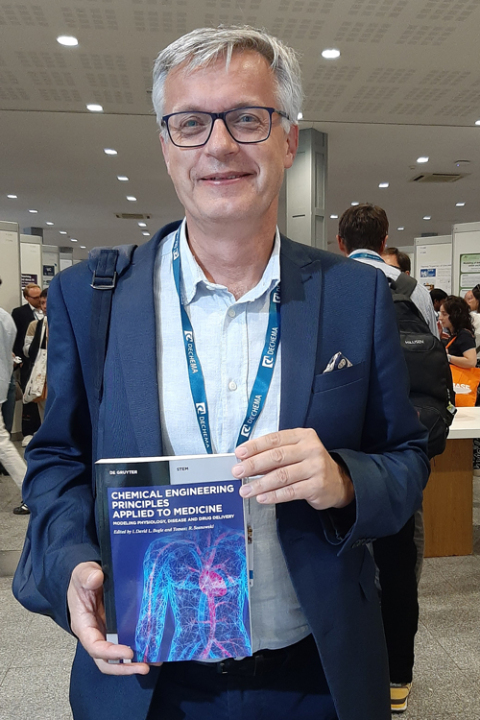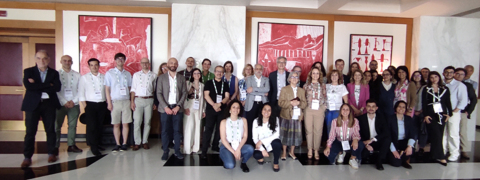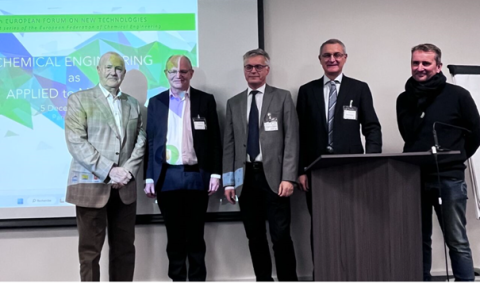Section on Chemical Engineering as Applied to Medicine
Welcome to the website of the EFCE Section Chemical Engineering as Applied to Medicine - ChemE-Med.

Current activities of the Section
NEW Book
Chemical Engineering Principles Applied to Medicine
Modeling Physiology, Disease and Drug Delivery
by David Bogle and Tomasz Sosnowski (see photo)
published by DeGruyter, 22 August 2025;
eBook ISBN: 9783111394558; brochure ISBN: 9783111394541
About the book:
Chemical Engineers are increasingly working on medical problems but so far there is no text that brings together such contributions for inspiring more research and as the basis for advanced courses. This work provides contributions on how Chemical Engineering approaches medical problems, particularly using modelling alongside experimentation and data analysis, to explore medical behaviors.
- Brings together Chemical Engineers with medical experts.
- Inspires young Chemical Engineers to see how and where and how their skill set can be applied to medical problems.
- Within the EFCE Forum on New Technologies Chemical Engineering as Applied in Medicine was seen as an inspiring new area of research.
- Applications of system modelling approaches from Chemical Engineering to modelling physiology and disease.
- Using engineering modelling methodologies to understand complexity in physiology and the response of humans to disease and treatment.

International Conference on Chemical Engineering as Applied to Medicine – CheEMed 2026
Cagliari, Italy, 26.-28 October 2026 (EFCE Event No. 828)
ChemEMed 2026 is organised by the EFCE Section on Chemical Engineering as Applied to Medicine in cooperation with the Italian EFCE Member Society AIDIC, the Italian Association of Chemical Engineering.
The main goal of the conference is to provide a forum for discussing the use of the scientific basis and methods of chemical and process engineering to solve various problems in physiology, medical diagnosis and therapy, health care, toxicology, etc.
Topics addressed at the meeting include (but are not limited to): I Process Systems Engineering Approach to Physiology; II - Mass Transfer in Physiological Systems and Artificial Organs; III - Novel Drug Delivery Systems; IV - Concepts of Process Intensification in Medical Applications; V - Advanced Biomaterials for Tissue Engineering and Regenerative Medicine; VI - Nanotechnology applied to Drug Delivery and Theranostics; VII - Machine Learning and Other Modeling Methods in Medical Engineering.
The call for papers is open. Deadline for abstract submission: 30 December 2025
The full set of final selected papers will be published into Chemical Engineering Transactions Journal, indexed by SCOPUS and SCHOLAR.
Website: https://www.aidic.it/cheme26/
Spotlight Talks
Other Events
One-day Scientific Conference
ChemE-Med 2024 - Chemical Engineering as Applied to Medicine
Salerno, Italy, 20 May 2024 (EFCE Event No 806)
The one-day Conference „ChemE-Med 2024” (Chemical Engineering as Applied to Medicine) took place on 20 May 2024 in Salerno, Italy, gathering 46 participants from several countries of Europe (Italy, UK, Spain, Portugal, France, Czech Republic, Poland, Switzerland). The organizers were: EFCE (EFCE Event No. 806), the Faculty of Chemical and Process Engineering - Warsaw University of Technology (Poland), University of Salerno (Italy), Narando SRL (Salerno, Italy), and AIDIC (Italy) as the entity responsible for technical issues.
Four thematic sessions with 21 oral presentations + 7 posters have been presented.
The Book of Abstracts edited by T.R. Sosnowski, D. Manca, D. Bogle and P. Ciambelli has been published by the Faculty of Chemical and Process Engineering, Warsaw University of Technology (PDF e-book: ISBN 978-83-953822-3-9).
The book can be accessed via the website (university repository): Publication – ChemE-Med 2024: Chemical Engineering as Applied to Medicine. 20th May 2024, Salerno, Italy. Book of abstracts – Warsaw University of Technology (pw.edu.pl)
or via the QR code:


The photo of the participants
Mission and Objectives of the Section
There is a significant change in the way that life and medical scientists and go about their business of unscrambling the mysteries of life and how clinicians diagnose and make operational decisions. Chemical Engineers have an important role to play in this field, one so important for human well-being. At the 2005 Chemical Engineering World Congress in Glasgow Denis Noble, Professor of Physiology at Oxford University, spoke in his plenary lecture about the computational model of the heart that he and his research group have developed over the past thirty or more years. Their project reflects true systems thinking in physiology and demonstrates the need for Engineers and, given the significant element of chemical transformation in the human body, particularly Chemical Engineers to contribute their skills and expertise to research and in due course practice in Physiology and Medicine.
Chemical Engineers are already bringing a significant skillset to physiology and medicine: modelling and systems engineering techniques to tackle the complexity of physiology, transport and reaction engineering to model medical instruments such as dialysis, designing artificial organs processing chemical entities, developing devices controlling drug and nutrient feeds, and considering the effects of particulates on human health to name a few. Chemical Engineers have been developing engineering design and analysis approaches to modelling biological systems across multiple levels – cell signalling networks, gene, protein and metabolic networks, movement of molecules and fluids, through to whole physiological systems.
There is some systematic activity by professional entities. Chemical Engineering Science has commissioned a special issue on Process Systems Engineering applied to Medicine. There would potentially be overlap with ESBES although their interests are very much in the production of medicines (and other substances) biologically rather than in aspects of human physiology.
The new Section aims to bring together the diverse activities of Chemical Engineers and their collaborators to share ideas, experience and techniques through meetings, workshops, and conferences, bringing together work by Chemical Engineers in different areas of medicine.
In addition to the fields of activities mentioned above, the Section will address the role of chemical engineering in the development of:
- Artificial organs
- Drug delivery systems
The Section would aim to work with professional bodies in Physiology and Medicine through joint workshops and to encourage joint projects amongst active members. It would also seek to inspire young people to study Chemical Engineering who also have an interest in medicine and health.
Section Members
CHAIR:
Prof. Tomasz R. SOSNOWSKI, Warsaw University of Technology, Poland
SECTION SECRETARY:
Prof. Davide MANCA, Politecnico di Milano, Italy
MEMBERS:
- Roberto ABBIATI, Roche, Switzerland
- Francesca Orsola ALFANO, University of Calabria, Italy
- Lucia BALDINO, University of Salerno, Italy
- Brahim BENYAHIA, Loughborough University, UK
- David BOGLE, University College London, UK
- Tao CHEN, University of Surrey, UK
- Paolo CIAMBELLI, Narrando, Italy
- Marc-Olivier COPPENS, Univ. College London, UK
- Christelle CRAMPON, Aix-Marseille University, France
- Maria Norberta DE PINHO, University of Lisboa, Portugal
- Loredana DE BARTOLO, Institute on Membrane Technology (CNR-ITM), Italy
- Maša KNEZ MAREVCI, University of Maribor, Slovenia
- Arkadiusz KUCZAJ, Phillip Morris International R&D, Switzerland
- Eva MARTIN VALLE, University of Salamanca, Spain
- Yasmine MASMOUDI, Aix-Marseille University, France
- Martin MORGENEYER, University of Technology of Compiegne, France
- Maria PAPATHANASIOU, Imperial College London, UK
- Cesar PICHARDO, Astra Zeneca, UK
- Alina RWEI, TU Delft, The Netherlands
- Simona SALERNO, Institute on Membrane Technology, National Research Council of Italy, Italy
- Viola TOKAROVA, University of Chemistry and Technology Prague, Czech Republic
Events of the Section
Spotlight Talk
Other Events
One-day Scientific Conference
ChemE-Med 2024 - Chemical Engineering as Applied to Medicine
Salerno, Italy, 20 May 2024 (EFCE Event No 806)
The one-day Conference „ChemE-Med 2024” (Chemical Engineering as Applied to Medicine) took place on 20 May 2024 in Salerno, Italy, gathering 46 participants from several countries of Europe (Italy, UK, Spain, Portugal, France, Czech Republic, Poland, Switzerland). The organizers were: EFCE (EFCE Event No. 806), the Faculty of Chemical and Process Engineering - Warsaw University of Technology (Poland), University of Salerno (Italy), Narando SRL (Salerno, Italy), and AIDIC (Italy) as the entity responsible for technical issues.
Four thematic sessions with 21 oral presentations + 7 posters have been presented.
The Book of Abstracts edited by T.R. Sosnowski, D. Manca, D. Bogle and P. Ciambelli has been published by the Faculty of Chemical and Process Engineering, Warsaw University of Technology (PDF e-book: ISBN 978-83-953822-3-9).
The book can be accessed via the website (university repository): Publication – ChemE-Med 2024: Chemical Engineering as Applied to Medicine. 20th May 2024, Salerno, Italy. Book of abstracts – Warsaw University of Technology (pw.edu.pl)

Photo of the participants
4th European Forum on New Technologies (EFNT)
5 December 2022, Paris, France
The meeting gathered 37 persons from 11 countries (France: 10; UK: 8; Italy: 4; Czech Republic: 3; Germany: 3; Finland: 2; Spain: 2; The Netherlands: 2; Poland: 1; Portugal: 1; Brasil: 1). Six persons represented industrial sector (e.g., AstraZeneca, Boehringer Ingelheim, Philip Morris Products, Sanofi, Veolia), other participants were affiliated with academia.
The Forum was opened by Giorgio Veronesi, the President of EFCE who welcomed all participants. A short welcome also was brought by Francois Nicol, the president of SFGP and Martine Poux (SFGP-EFCE), the organizer of EFNT. Then a short introduction was done by David Bogle and Tomasz Sosnowski, who defined the background and scope of a new EFCE Section “Chemical Engineering as Applied to Medicine”.
The scientific programme of 4th SFNT was divided into 3 parts:
- part A “Physiology and chemical engineering – the obvious link” (3 lectures + discussion),
- part B “Chemical Engineering in the specific challenges of medicine” (4 lectures + discussion)
- part C “Advancements of medical technologies and products via Chemical Engineering approach” (4 lectures + discussion).
The scientific event was connected to the kick-off meeting of the new EFCE Section “Chemical Engineering as Applied to Medicine” (ChemE-Med).
Previous activities
Inaugural meeting
The inaugural meeting of the Section took place on 5 December 2022 in Paris, France in conjunction with the "4th European Forum on New Technologies - Chemical Engineering as Applied to Medicine". After the scientific programme, the participants could declare their access to the Section “Chemical Engineering as Applied to Medicine”. 17 participants from 8 countries (UK, IT, GE, CZ, FR, ESP, NED, POL, POR) joined the Section and elected the Section Chair: Tomasz Sosnowski (Warsaw University of Technology, Poland) and secretary: Davide Manca (Politecnico di Milano, Italy).

From left to right: Giorgio Veronesi (President of EFCE), David Bogle (former Scientific Vice-President of EFCE), Tomasz Sosnowski (Chair of “ChemE-Med” Section), Davide Manca (Secretary of “ChemE-Med” Section), Petr Kluson (Scientific Vice-President of EFCE in December 2022)
